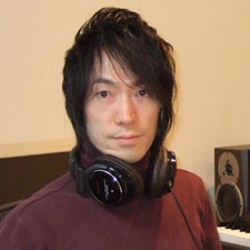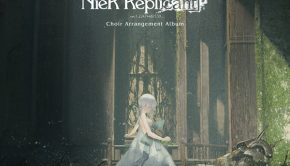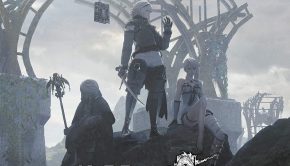Masato Kouda Profile
 |
Also Known As: 甲田雅人 (こうだまさと) / Masato Coda / Masato Koda / Masato Kohda |
| Date of Birth: October 24, 1971 (Fujiyoshida) |
|
| Residence: Tokyo |
|
| Game Works: Monster Hunter, Devil May Cry, Wild Arms, El Shaddai |
|
| Official Site: Japanese Profile |
History
| Organisation | Type | Tenure | Role |
| Namco | Game Developer | 1997 – 2006 | Composer |
| Namco Bandai Games | Game Developer | 2006 – 2012 | Composer |
| GE-ON-DAN | Artist Collective | 2010 – 2011 | Member |
| Namco Bandai Studios | Game Developer | 2012 – | Composer |
History
| Organisation | Type | Tenure | Role |
| Capcom | Game Developer | 1994 – 2003 | Composer |
| The Star Onions | Music Group | 2005 – 2009 | Arranger, Keyboards |
| Design Wave | Music Production | 2008 – | Composer |
| Pia-Coms | Music Group | 2010 – 2011 | Arranger, Piano |
Biography
Masato Kouda is a composer at Design Wave best known for his works on the Monster Hunter, Devil May Cry, and Wild Arms series. Born on October 24, 1971 in Fujiyoshida, he had a passion for music since his youth, having taken four years of classical piano lessons and later played keyboard for rock band. He had enjoyed soundtracks from an early age, particularly appreciating John Williams’ orchestral scores for Star Wars and Jaws.As he approached adulthood, he also began to consider the possibilities of video game music, feeling amazed by the orchestrated introduction to the Super Nintendo’s Final Fantasy IV and various other creations by Nobuo Uematsu thereafter. He considered a career as a game composer and dreamed what it would be like to record with a full orchestra someday. After receiving extensive classical training at the Kunitachi College of Music, he joined the sound team of Capcom in April 1994, a month after graduating.
During his initial years at Capcom, Kouda focused on composing fighting games for the arcade. He debuted on Cyberbots: Full Metal Madness, where he worked alongside numerous senior composers. He carefully observed their work patterns to understand how to create suitable stage themes and accommodate the technological limitations on the arcade. His main contribution was the jazzy piano-based Colonial Satellites theme. Following this debut, he made more elaborate contributions to Vampire Saviour: The Lord of Vampire, uniquely blending gothic stylings with contemporary techno and jazz elements, and created a range of nostalgic character themes for the crossover title Marvel vs. Capcom. Between these works, he also arranged three stage themes for Mega Man 2: The Power Fighters and composed some poppy tracks for the puzzle titles Super Puzzle Fighter II Turbo and Quiz Narairo Dreams: Miracle of the Rainbow-Colored Town.
Kouda made his solo debut with the arcade and console versions of the Dungeon & Dragons title Shadows Over Mystara. Despite hardware limitations, he persevered to create an exuberant fantasy score filled with lavish orchestrations and convincing samples. In further solo roles, he created a diverse and catchy accompaniment to the Disney crossover Magical Tetris Challenge in 1998, before exploring his versatility further on the Japan exclusive Startling Adventures, which packaged three very different games in one. In 2001, Kouda had a supporting role on the cutting-edge score for the action title Devil May Cry. Among his responsibilities were the electrifying normal battle theme and epic final battle themes among others. He returned as the lead composer on Devil May Cry 2 thereafter, maintaining the darkness and intensity of the original with various expertly mixed stylistic fusions. Before leaving Capcom, he contributed a piano arrangement for a Chaos Legion album and two short contributions to Resident Evil: Outbreak.
Kouda decided to become a freelance composer in 2003 while developing the score for Monster Hunter. When he witnessed the game in motion, he had an epiphany that the soundtrack needed to express the intensity of a feature film score. For the main theme, he captured the bravery and might of the characters with fanfare-like brass melodies and a cinematic structure inspired by Superman. He recorded the resultant work with full orchestra and, experiencing some synaesthesia, used the key of E Flat to evoke the colour of mossy green. He embellished these thematic foundations with the hugely popular successive PSP spinoffs of the series, while co-composers created the rest of the music. He also took a leading role on 2006’s Monster Hunter 2, building greatly on the original with a an array of orchestral action themes and a spiritual vocal theme. Kouda also joined the composition team for the MMORPG Monster Hunter Frontier, incorporating regional and organic instrumentation into the setting themes.
Having made a rumble in the industry with the original Monster Hunter, Kouda was asked to contribute to Sony Computer Entertainment’s RPG Wild Arms 4 in 2005 after lead composer Michiko Naruke fell ill. The composer carefully preserved the spaghetti western influence of the series’ music, while introducing diverse worldly and contemporary influences that he had encountered elsewhere in his career. Alongside members of Elements Garden, he maintained lead roles on the simultaneously developed Wild Arms 5 and Wild Arms XF. On both soundtracks, he was able to maintain the series’ characteristic sound in the absence of Michiko Naruke, while offering fresh developments and polished implementation. He persevered to ensure that Wild Arms 5 was filled with diverse and elaborate compositions, and the resultant soundtrack spanned an unprecedented six discs. On Wild Arms XF, he also made many exuberant contributions while carefully adapting to the tactical gameplay.
Between his roles on major franchises, Kouda reunited with his former Capcom colleague Naoshi Mizuta to become a member of the Final Fantasy XI tribute band The Star Onions in 2005. He made three contrasting arrangements on their debut album before appearing as a keyboardist in two of their subsequent concerts at fan festivals. After leaving behind production of the Wild Arms and Monster Hunter franchises, Kouda worked on a range of projects in smaller roles. In 2008, he contributed background music to the gardening simulator Shikitei and the retro revivals Commando 3 and 1942: Joint Strike, each of which demanded very different music. In major collaborative productions, he contributed three very different arrangements on Super Smash Bros. Brawl, dedicated to the Metroid, Pokémon, and Mother series, between penning a tribute Thunder Cross on Otomedius G and writing several tracks for Otomedius X. He also created two particularly atmospheric instrumental interludes on the concept vocal album Istoria ~Musa~.
In September 2008, Kouda decided to become a leading composer of Design Wave. Set up the preceding year by sound designer Atsushi Mori, the company offers music, sound design, and recording for video games and other media. The majority of his initial works at the company focused on revisiting earlier projects. He reunited with The Star Onions to on their second album Sanctuary, pursuing a more acoustic direction that complemented the tone of the originals, between reuniting with his numerous Capcom contemporaries on Mega Man 10’s arranged album. An experienced pianist, Kouda also wrote and performance expressive arrangements of Commando and Castlevania for Dog Ear Records’ retro tribute album Pia-Com II. Alongside with the other two members of the Pia-Coms, he went on to perform these pieces at several special events. The artist also made heartfelt contributions to Castlevania Tribute Vol. 2 and the Nier Piano Collections, in addition to attending several symphonic performances of his Monster Hunter compositions.
Kouda has scored several novel game projects on behalf of Design Wave in the last few years. He offered a range of fusions with traditional Japanese music on the DS’ Shonen Kininden Tsumuji in 2010. The artist pursued further novel creative directions on Ignition Entertainment’s El Shaddai: Ascension of the Metatron. He portrayed the desolate landscapes of the game with dark electro-acoustic ambience and intricate cinematic underscore, while reflecting the game’s religious storyline with choral and organ performances. He also briefed co-composer Kento Hasegawa and Imagine’s orchestrators throughout the production to achieve an authentic and cohesive sound. Kouda’s latest score was Conception: Please Give Birth to My Child; despite the game’s bizarre concept, the artist recorded a diverse score for the title, capped off with a prominent theme song “Destiny” sung by nano. Despite a recent drop in prominence, it is expected he will be involved in various scoring and album projects over coming years.
References:
– Various Game & Album Credits
– VGMdb Discography
– Official Site (Japanese)
– Company Site (Japanese)
– Interview with Game Set Watch (English, March 2010)
©Biography by Chris Greening (September 2010). Last update on January 19, 2013. Do not republish without formal permission.
Posted on January 19, 2013 by Chris Greening. Last modified on March 21, 2014.














